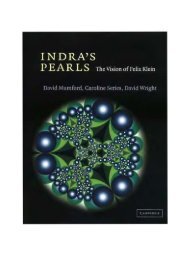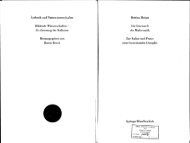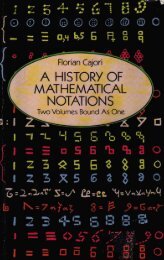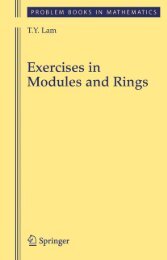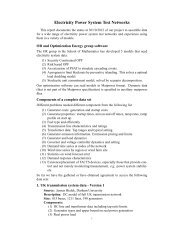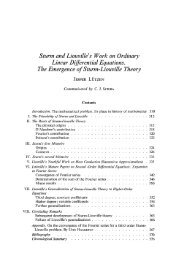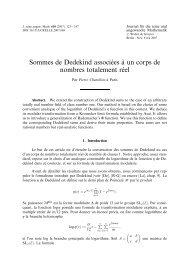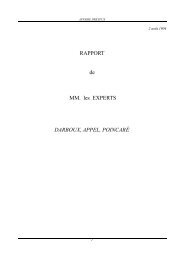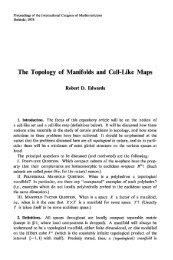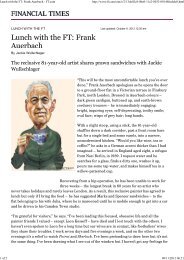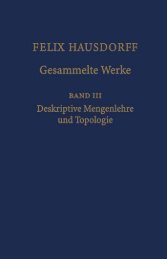- Page 3 and 4:
ABEL’S THEOREM IN PROBLEMS AND SO
- Page 5 and 6:
Abel’s Theorem in Problems and So
- Page 7 and 8:
Contents Preface for the English ed
- Page 9 and 10:
A.10.3 The integrable case A.11 Top
- Page 11 and 12:
Preface to the English edition by V
- Page 13 and 14:
of the differential equations. Unfo
- Page 15 and 16:
Preface In high school algebraic eq
- Page 17 and 18:
Introduction We begin this book by
- Page 19 and 20:
Introduction 3 where by is indicate
- Page 21 and 22:
Introduction 5 By Viète’s theore
- Page 23 and 24:
Introduction 7 We will be able to p
- Page 25 and 26:
Chapter 1 Groups 1.1 Examples In ar
- Page 27 and 28:
Groups 11 the triangle ABC into its
- Page 29 and 30:
Groups 13 7. Find all symmetries of
- Page 31 and 32:
Groups 15 notations (see the soluti
- Page 33 and 34:
Groups 17 element, which we will de
- Page 35 and 36:
Groups 19 35. Suppose that is the m
- Page 37 and 38:
Groups 21 If a group is isomorphic
- Page 39 and 40:
Groups 23 tude); (rotation by 180°
- Page 41 and 42:
Groups 25 Hence left cosets generat
- Page 43 and 44:
Groups 27 as a permutation of the t
- Page 45 and 46:
Groups 29 102. Let be the order of
- Page 47 and 48:
Groups 31 111. Find all normal subg
- Page 49 and 50:
Groups 33 FIGURE 8 127. Prove that
- Page 51 and 52:
Groups 35 137. Prove that ker is a
- Page 53 and 54:
Groups 37 We now observe what happe
- Page 55 and 56:
Groups 39 FIGURE 12 vertices; 4) ro
- Page 57 and 58:
Groups 41 Every permutation of degr
- Page 59 and 60:
Groups 43 180. Prove that by multip
- Page 61 and 62:
Chapter 2 The complex numbers When
- Page 63 and 64:
The complex numbers 47 195. Prove t
- Page 65 and 66:
The complex numbers 49 where is the
- Page 67 and 68:
The complex numbers 51 Consequently
- Page 69 and 70:
The complex numbers 53 For complex
- Page 71 and 72:
The complex numbers 55 think that n
- Page 73 and 74:
The complex numbers 57 214. Let us
- Page 75 and 76:
The complex numbers 59 219. Prove t
- Page 77 and 78:
The complex numbers 61 functions (s
- Page 79 and 80:
The complex numbers 63 of continuit
- Page 81 and 82:
The complex numbers 65 erations of
- Page 83 and 84:
The complex numbers 67 a) b) c) d)
- Page 85 and 86:
The complex numbers 69 REMARK. If a
- Page 87 and 88:
The complex numbers 71 2.8 Images o
- Page 89 and 90:
The complex numbers 73 where all th
- Page 91 and 92:
The complex numbers 75 in such func
- Page 93 and 94:
The complex numbers 77 FIGURE 26 no
- Page 95 and 96:
The complex numbers 79 C from to th
- Page 97 and 98:
The complex numbers 81 DEFINITION.
- Page 99 and 100:
The complex numbers 83 FIGURE 32 cu
- Page 101 and 102:
The complex numbers 85 to infinity
- Page 103 and 104:
The complex numbers 87 property is
- Page 105 and 106:
The complex numbers 89 means will b
- Page 107 and 108: The complex numbers 91 For example,
- Page 109 and 110: The complex numbers 93 of the Riema
- Page 111 and 112: The complex numbers 95 in Figure 38
- Page 113 and 114: The complex numbers 97 permutation
- Page 115 and 116: The complex numbers 99 2.13 Monodro
- Page 117 and 118: The complex numbers 101 First we pr
- Page 119 and 120: The complex numbers 103 and prove t
- Page 121 and 122: Chapter 3 Hints, Solutions, and Ans
- Page 123 and 124: Solutions 107 positive integer unde
- Page 125 and 126: Solutions 109 on the left and by on
- Page 127 and 128: Solutions 111 39. a) See Table 8; b
- Page 129 and 130: Solutions 113 of the real numbers i
- Page 131 and 132: Solutions 115 to all and therefore
- Page 133 and 134: Solutions 117 is a subgroup of the
- Page 135 and 136: Solutions 119 hypothesis. The group
- Page 137 and 138: Solutions 121 The given group is th
- Page 139 and 140: Solutions 123 of symmetries of the
- Page 141 and 142: Solutions 125 i.e., there exists an
- Page 143 and 144: Solutions 127 Answer. The normal su
- Page 145 and 146: Solutions 129 In this way the quoti
- Page 147 and 148: Solutions 131 sends every into itse
- Page 149 and 150: Solutions 133 ement of the commutan
- Page 151 and 152: Solutions 135 143. Let be the three
- Page 153 and 154: Solutions 137 150. See 57. Suppose
- Page 155 and 156: Solutions 139 subgroup. Hence if a
- Page 157: Solutions 141 is commutative. Since
- Page 161 and 162: Solutions 145 FIGURE 43 190. The pe
- Page 163 and 164: Solutions 147 permutations of type
- Page 165 and 166: Solutions 149 is a field. 195. We h
- Page 167 and 168: Solutions 151 necessarily that and
- Page 169 and 170: Solutions 153 Let C be the field of
- Page 171 and 172: Solutions 155 in as numerators and
- Page 173 and 174: Solutions 157 c) d) e) where 226. W
- Page 175 and 176: Solutions 159 function of real argu
- Page 177 and 178: Solutions 161 i.e., Consider the re
- Page 179 and 180: Solutions 163 Choose as the smalles
- Page 181 and 182: Solutions 165 Since the function is
- Page 183 and 184: Solutions 167 FIGURE 55 FIGURE 56 F
- Page 185 and 186: Solutions 169 FIGURE 60 257. Suppos
- Page 187 and 188: Solutions 171 265. 266. 267. If the
- Page 189 and 190: Solutions 173 following way. If the
- Page 191 and 192: Solutions 175 for all such that and
- Page 193 and 194: Solutions 177 b) In order for to va
- Page 195 and 196: Solutions 179 to the condition coin
- Page 197 and 198: Solutions 181 are continuous functi
- Page 199 and 200: Solutions 183 turn around the other
- Page 201 and 202: Solutions 185 sought is shown in Fi
- Page 203 and 204: Solutions 187 FIGURE 86 FIGURE 87 p
- Page 205 and 206: Solutions 189 sum of multi-valued f
- Page 207 and 208: Solutions 191 316. a) Let and be th
- Page 209 and 210:
Solutions 193 by the formal method,
- Page 211 and 212:
Solutions 195 The correct scheme is
- Page 213 and 214:
Solutions 197 branch of the functio
- Page 215 and 216:
Solutions FIGURE 110 FIGURE 111 329
- Page 217 and 218:
Solutions 201 It follows that and b
- Page 219 and 220:
Solutions 203 340. To every sheet o
- Page 221 and 222:
Solutions 205 Since by hypothesis t
- Page 223 and 224:
Solutions 207 moving along a curve
- Page 225 and 226:
Drawings of Riemann surfaces 209 Th
- Page 227 and 228:
FIGURE 119 211
- Page 229 and 230:
FIGURE 121 213
- Page 231 and 232:
FIGURE 123 215
- Page 233 and 234:
FIGURE 125 217
- Page 235 and 236:
FIGURE 127 219
- Page 237 and 238:
Appendix by A. Khovanskii: Solvabil
- Page 239 and 240:
Solvability of Equations 223 functi
- Page 241 and 242:
Solvability of Equations 225 Suppos
- Page 243 and 244:
Solvability of Equations 227 where
- Page 245 and 246:
Solvability of Equations 229 finds
- Page 247 and 248:
Solvability of Equations 231 quadra
- Page 249 and 250:
Solvability of Equations 233 More p
- Page 251 and 252:
Solvability of Equations 235 group.
- Page 253 and 254:
Solvability of Equations 237 Every
- Page 255 and 256:
Solvability of Equations 239 The gr
- Page 257 and 258:
Solvability of Equations 241 FIG. 1
- Page 259 and 260:
Solvability of Equations 243 are ob
- Page 261 and 262:
Solvability of Equations 245 corres
- Page 263 and 264:
Solvability of Equations 247 where
- Page 265 and 266:
Solvability of Equations 249 up to
- Page 267 and 268:
Solvability of Equations 251 fined
- Page 269 and 270:
Solvability of Equations 253 the qu
- Page 271 and 272:
Solvability of Equations 255 the no
- Page 273 and 274:
Solvability of Equations 257 THEORE
- Page 275 and 276:
Solvability of Equations 259 where
- Page 277 and 278:
Bibliography [1] [2] [3] [4] [5] [6
- Page 279 and 280:
[23] [24] [25] [26] [27] [28] 263 V
- Page 281 and 282:
Appendix (V.I. Arnold) The topologi
- Page 283 and 284:
Index Abel’s theorem, 6, 103 addi
- Page 285:
pack of sheets, 96 parametric equat



